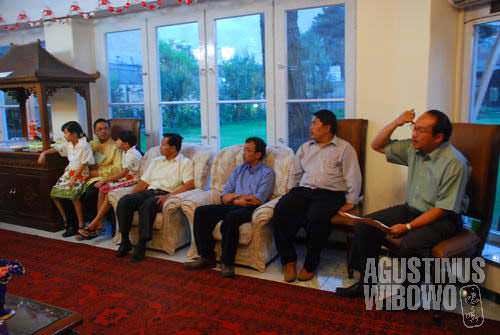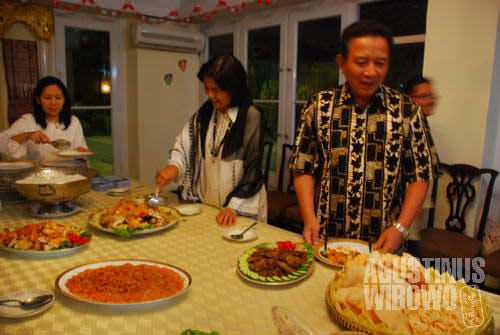Kabul – Indonesian Role in the Hostage Crisis

The diplomat-in-charge announces the detail of the story to the community of Indonesian expats in Kabul (which is less than a dozen)
If there is one more reason to be proud as an Indonesian, then this comes from the southern part of Afghanistan.
Yesterday we were very relieved to hear that a breakthrough had been achieved in the negotiation between Taliban and Korean delegates after a face-to-face meeting held in Ghazni city. The two sides agreed at 5 points of agreement: first, all Koreans will quit Afghanistan by the end of 2007; second, Koreans working for NGOs in Afghanistan will leave the country by the end of this month; third, no more Korean Christian missionaries are allowed to enter Afghanistan; fourth, Koreans will not be attacked when evacuating from this country; five, Taliban have canceled the demands of prisoners exchange.
There is not much known by the media and international world, that Indonesia has a big role in this breakthrough of the hostage crisis. A quote from The News
When asked whether there was any secret deal also, Taliban commander Abdullah said there was none. He said an Indonesian diplomat, an official from the ICRC and Afghan tribal elder Haji Zahir from Ghazni province had also attended the face-to-face meeting in Ghazni city Tuesday and everything was discussed and agreed openly in their presence. The Taliban commander said the Indonesian diplomat at the meeting Tuesday was brought along by the South Korean government officials. “One reason that we agreed to release the Koreans was due to appeals by many countries, Islamic organizations and scholars and Afghan tribal elders. Our Muslim brothers from Indonesia also became involved and so did the ICRC. It is primarily on humanitarian grounds that we have freed the Korean hostages,” he stressed.
And a quote from the Jakarta Post:
Foreign Ministry secretary general Imron Cotan said that upon receiving a request from the Taliban on Monday, Foreign Minister Hassan Wirayuda, who is now in Latin America for an official visit, ordered the Indonesian ambassador in Kabul to verify the request, and contacted the Afghanistan and South Korean governments to make it clear that all parties accepted Indonesia’s role.
“We made it clear also that our role would be that of a mediator during the negotiation and a witness – as the Taliban wanted us to be – of the release of the hostages.
Indonesia has been involved in several successful mediating roles, including helping end the Cambodian conflict in the 1980s, facilitating the reunion of Charles Robert Jenkins, an American who defected to North Korea, and his family in Jakarta in 2004, and the release of kidnapped journalists in Iraq in 2005 In Bali, President Susilo Bambang Yudhoyono praised the successful role of Indonesian diplomats in the negotiation. He said Indonesia’s involvement began when he told the South Korean president of his readiness to help the problem when he visited the country last month before he offered a similar service to the Afghanistan ambassador here.
Today, in a party in our embassy, our Ambassador announced about the case and the wish of the Embassy that the Indonesian role not to be blown up by the media. Yesterday morning, Mr. Ambassador received a call from the President SBY stating that Indonesia had received Taliban wish that the country to be involved in the negotiation between them and the South Korean delegates. It was early morning and the Ambassador contacted the South Korean ambassador for talk, and they agreed to meet an hour later. Everything was done very quickly. The South Korean agreed to bring Indonesian representative in the talk. And this was approved by the Afghan government as well.
SBY, in his telephone talk, asked the Ambassador, “Who will go?”
The ambassador said, “I am ready, Sir.”
“No. You should not go. You are too ‘expensive’”, said the President, realizing that this is a risky decision and losing an ambassador in a war-torn country is indeed unaffordable.
So, the Ambassador then appointed a lower rank diplomat. The identity of this man is not to be disclosed to outsiders, Mr. Ambassador reminded us in his explanation, but the diplomat’s name has actually appeared in Associated Press interview.
Then this diplomat and an embassy driver went all the way to Ghazni together with the South Korean delegates and a convoy of Afghan security guards. The negotiation between Taliban and South Korean delegates was conducted by ICRC with Indonesia as the mediator. The negotiation was off the record and even the existence of an Indonesian involved in the talk is unknown by most media.
Aini, the wife of the driver, said that she could not bear the night when her husband went to Ghazni to ‘meet’ the Taliban.
“Who can sleep if her husband is going to meet Taliban? Do not say about sleeping. I even could not talk at all.” What she did the whole night was only offering prayers to God, wishing her husband to return home safely. Madam Ambassador even fasted the whole day, and Mr. Ambassador was in the same worry. “It was indeed easier to go by myself rather than sending someone else to go. The feeling of responsibility and the worry of failing were more difficult to bear.”

And after that… fiesta!
Madam Ambassador and Aini’s prayers were heard by God. The negotiation was successful. And until I write this post, 8 Korean hostages have been released by Taliban. “Actually we are proud that we are respected,” said the Ambassador, “I remember the letter of the Taliban, signed by Mullah Mohammad Omar Mujahid, saying that they release the hostage because they trust Indonesia as the Muslim brothers.” But, the Ambassador emphasized, “The involvement of Indonesia in this issue is only due to humanitarian reason. It’s not political at all. It does not mean we recognize Taliban, neither have we supported Karzai. We are not political. We were there just to help the South Korean brothers. It’s because of humanity, nothing more.”
After the negotiation, the delegates were sent back to Kabul with a big convoy of Afghan police, due to sensitive security in the South. There were 19 cars of the police to guard the delegates. Mr. Ambassador smiled to the diplomat-in-honor, “It’s a life time experience, isn’t it? I am sure even SBY has never been guarded by 19 convoys.”
As the Indonesian government didn’t want any publication on this issue, the embassy today refused Al Jazeera request for interview. “Just wait for press release from Jakarta,” he said.






Nice to hear that even Taliban are treat Indonesian as brother.
Then our diplomacy in Afghanistan is accepted warmly.